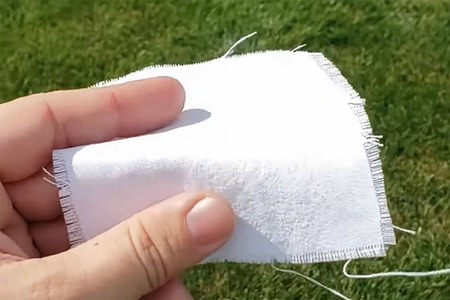

Chalk-based coating
Researchers from the University of Massachusetts have created a chalk-based coating for textiles that can reduce air temperatures beneath the fabric by up to 8°F, offering a sustainable solution for cooling without the need for energy consumption.
This innovative coating is made from calcium carbonate and barium sulfate, materials that effectively reflect UV and near-infrared light, thereby enhancing comfort in hot climates. Simulation tests have confirmed the durability of this coating, making it a promising option for regions with high temperatures.
Existing textiles that reflect the sun’s rays or dissipate heat often require specialized fibers or complex manufacturing processes. However, the newly developed chalk-based coating provides a simpler, more accessible solution. It can be applied to nearly any commercially available fabric, transforming it into a material that helps keep people cool.
Evan D. Patamia, a graduate student at the University of Massachusetts Amherst, says, “Our coating offers a significant cooling effect, which could be a valuable resource for people struggling to stay cool in extremely hot environments.”
Trisha L. Andrew, a chemist and materials scientist collaborating with Patamia, explains the science behind the innovation: “When you walk into sunlight, your body and clothing absorb ultraviolet and near-infrared light, causing you to heat up. Our technique uniquely converts almost any fabric into a cooling material without requiring power input.”
Twintex, a pioneer in sustainability within the garment industry, is advancing circular fashion with the launch of its Sustainable Spring/Summer…
Researchers have launched DyeLoop – Circular Technologies for Textile Dyeing, an initiative aimed at making textile dyeing more cost-effective and…
Hugo Boss has introduced Eightyards, a wholly-owned subsidiary based in Metzingen, Germany, dedicated to reselling, reusing, and upcycling surplus textiles.
Nanamica unveils its second collection featuring Brewed Protein fibers, an innovative plant-derived material created through microbial fermentation.
Warwick researchers, in collaboration with CreateMe Technologies, have developed a thermo-reversible adhesive, enhancing textile recycling and sustainability.
The French Parliament is poised to approve a ground-breaking environmental bill that limits the production and sale of goods containing…